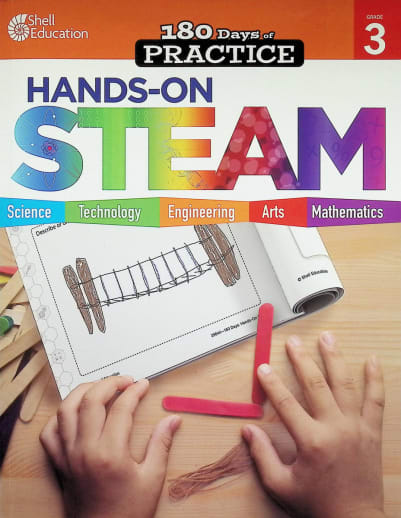Students can work on STEAM (science, technology, engineering, the arts, and math) projects in this workbook. These skills help kids make connections in concepts such as creativity, collaboration, critical thinking, and communication. Twelve, three-week units involve projects in physical, life, and earth sciences. One unit covers balanced and unbalanced forces. Students read and study pictures, experiment with air resistance, draw pictures about unbalanced forces, analyze a diagram of forces, and create paper airplanes. Each unit includes two support pages with instructional guidance. Aligns to Next Generation Science Standards. Reproducible for classroom use only. ~ Gina
180 Days of Practice: Hands-On STEAM: Grade 3
Description
180 Days™: Hands-On STEAM for Grade 3
- Uses daily hands-on lab activities to explore STEM concepts
- Motivates students with quick independent learning activities focusing on exploring STEAM concepts, building critical-thinking skills, and refining the problem-solving process
- Makes at-home learning, whole-class instruction, or small-group support, quick and easy
- Includes standards-based activities, easy-to-follow instructions, and an answer key to quickly assess student understanding
Teachers rely on the daily practice workbooks to save them valuable time. The hands-on lab activities require little prior knowledge and use typical classroom or home materials. The activities can also be used for intervention skill building to address learning gaps. Aligns to Next Generation Science Standards (NGSS).
STEAM practice integrates science, technology, engineering, the arts, and math. It also emphasizes understanding math and science while acquiring engineering skills. Art is included to bring the creative aspect into projects. These workbooks provide STEAM activities arranged into 12, three-week units. An overview in the front shows you how to structure each week. Two different pacing schedules are included. Each unit includes two teaching support pages with instructional guidance. Supplies needed for projects and an answer key for the unit are also listed on these pages.
Week 1 gives students background content as they read, answer questions, do hands-on activities, draw and label diagrams, and create charts and graphs. Students are introduced to the STEAM Challenge in Week 2. Guided questions are provided, and students record their plans as they research and brainstorm, sketch designs and test their designs. In week 3, students continue working on their designs and ways to improve them based on their findings in week 2. Units are centered around physical, life, and earth sciences.
A grading rubric for the STEAM Challenges is included in the back of each book. Content aligns to Next Generation Science Standards. Digital resources can be downloaded on the publisher’s website. Resources include a safety contract, sentence frames to help with student feedback, materials list, and student glossary. I think students will really benefit from this enrichment resource. The projects are engaging for each age group and easy to implement using typical household materials. Reproducible for classroom use only. ~ Gina
| Product Format: | Paperback |
|---|---|
| Grade: | 3 |
| Brand: | Shell Education |
| ISBN: | 9781425825300 |
| Length in Inches: | 11 |
| Width in Inches: | 8.5 |
| Height in Inches: | 0.5 |
| Weight in Pounds: | 1.2 |

